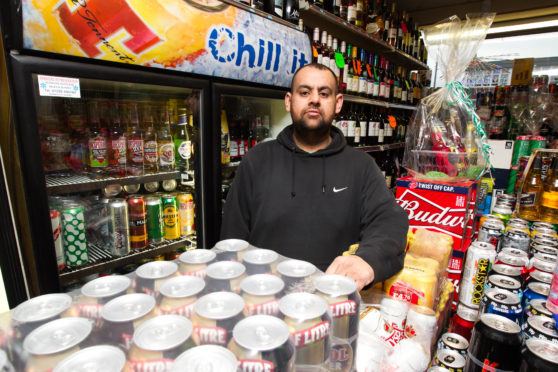
The Scottish Government’s crackdown on cheap alcohol has driven some drinkers to drugs, experts fear.
The Scottish Government introduced minimum unit pricing (MUP) a year ago in a bid to tackle Scotland’s drink problem.
The impact of the policy will be evaluated by experts over the next five years but industry research suggests Scots are consuming up to 25 million units of alcohol more than before the MUP was introduced.
And there is increasing evidence that it may be creating other health and addiction problems in Scotland’s poorest postcodes.
Usy Munir, who own an off-sales in Glasgow, said he has seen sales of cider drop dramatically but little evidence of customers drinking less.
He said: “I’m not selling as much vodka but maybe more Mad Dog [fortified wine] or Buckfast.
“There was also an increase in drug consumption in this area after minimum pricing kicked in.”
Under the new policy, the price of a bottle of Frosty Jack’s cider in his shop in Shettleston has risen from £3.50 to £11, while a bottle of Strongbow cider increased from £2.99 to £5.
Mr Munir said sales of both brands had dropped from 20 cases a week, to an average of four. He said sales of vodka and wine had dropped 50%.
Consultant Dr Michael Colvin, who last year warned minimum pricing could result in heavy drinkers swapping alcohol for drugs, said it would take years to assess the overall impact of the policy.
“I am not opposed to MUP, but I do think a broad range of possible consequences should be considered when evaluating its success,” he said.
David Liddell, chief executive of Scottish Drugs Forum, said there were concerns vulnerable people would switch from alcohol to cheaper substances as a result of MUP. He said the most obvious example was benzodiazepines (street Valium), and there had been “occasional reports” of possible cases but “no clear evidence has emerged”.
John Holleran, of charity Scottish Families Affected by Drugs and Alcohol, said 5% of families who had spoken about MUP when contacting their helpline said it had resulted in a swap to other types of alcohol.
Hugh Hill, director of services at the Simon Community Scotland, which works with the homeless, said there had been no obvious impact of MUP. He said: “We are not seeing any significant change in the drinking habits of our client group.”
Mr Hill said there was concern over drug use, but linked this to the cheapness of street Valium and not MUP.
Evaluations of MUP will be undertaken over the next five years, with Scottish ministers then reporting to parliament.
Researchers will assess a number of areas, including alcohol-related hospital admissions and deaths and increased consumption of other substances.
Professor Jonathan Chick, medical director at addiction clinic Castle Craig Hospital, said it was expected MUP would have an impact on deaths from liver disease over the next two to three years.
He added: “MUP was not designed to reduce overall consumption, but to have an effect on those being most damaged by alcohol, and to halt the trend over the last 30 years of increased mortality and harm.”
Scotland Public Health Minister Joe FitzPatrick said the first “meaningful” analysis of sales of alcohol since the introduction of the policy would be published in June.

Enjoy the convenience of having The Sunday Post delivered as a digital ePaper straight to your smartphone, tablet or computer.
Subscribe for only £5.49 a month and enjoy all the benefits of the printed paper as a digital replica.
Subscribe